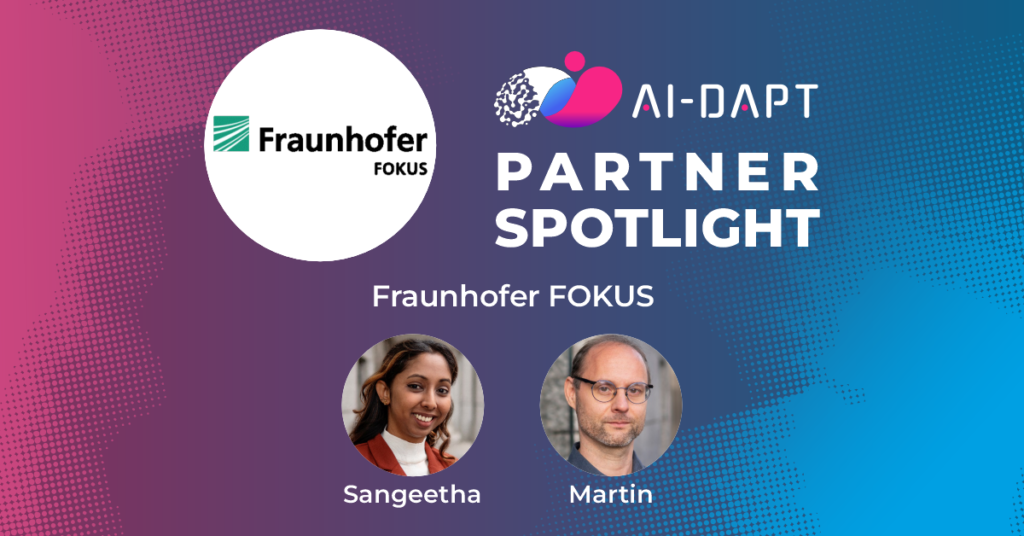AI-DAPT partner spotlight

Driving Digital Innovation through Applied Research: Fraunhofer FOKUS
The Fraunhofer Society, based in Germany, is a leading applied research organization. By concentrating on future-relevant key technologies and transferring ideas and research findings to industry, business, and society, Fraunhofer is helping to shape German and European innovation. The Fraunhofer Institute for Open Communication Systems (Fraunhofer FOKUS) is a research institute within the Fraunhofer Society and acts as a project partner in AI-DAPT. Fraunhofer FOKUS conducts research on digital transformation and its impact on economics, technology, and our society. Since 1988, Fraunhofer FOKUS has been supporting commercial enterprises and public administrations in the shaping and implementation of digital transformation. For this purpose, Fraunhofer FOKUS provides research services ranging from requirements analysis to consulting, feasibility studies, technology development right up to prototypes and pilots.
Our Team’s Research Areas: Efficient Data Handling (for AI)
Fraunhofer FOKUS contributes to the AI-DAPT project through the Digital Public Services division. Our sub-team of dedicated researchers brings a strong passion for resilient, AI-driven methodologies. With extensive expertise in data science, our experienced programmers focus on integrating AI enhancements into the software components we create. Our research prioritizes data processing, management, and preparation, all of which inform our contributions to AI-DAPT. We aim to refine workflows and emphasize data curation processes that support efficient data handling and system robustness – core aspects of AI-DAPT’s objectives.
Our Contribution to AI-DAPT: Data Curation Methods and Services for Enhanced Data Quality
AI-DAPT adopts a data-centric approach in AI, aiming at introducing automation and AI-based systematic methods to support the design, the execution, the observability and the lifecycle management phases of robust data-AI pipelines. The project aims to automate and streamline data and AI management processes, enhancing efficiency in real-world applications across industries such as manufacturing, energy or healthcare.
In this context, the preparation and curation of underlying data are crucial, as the effectiveness of AI models depends on data quality. For instance, data annotation involves labeling raw data to provide context, which is essential for training AI models to recognize patterns and make accurate predictions. Automating this process (with a human-in-the-loop approach) enhances precision and consistency, ultimately leading to more robust and reliable AI solutions.
At AI-DAPT, we are deeply engaged in aspects like these related to data preparation and curation. As a technical partner within the project, we lead the Task „Data Curation Methods & Services“, concentrating on data handling and preparation. The task is dedicated to investigating, designing, and developing methods and services centered on the Data Curation for AI aspects of an automated data/AI pipeline. The goal is to develop services specifically designed to provide high-quality data, ultimately supporting industry professionals engaged in these processes. This includes streamlining processes such as data annotation, cleaning, documentation, and selection, all of which ensure that the data is representative and appropriate.
While we are responsible for the entire task, we are specifically developing two key components:
- The Data Annotation Engine, which semantically annotates data by mapping it to the appropriate data models and labelling data points manually or automatically, possibly even with AI methods.
- The Data Documentation Engine, which will automatically extract and handle suitable metadata at dataset and feature levels.
Together, these components work to streamline the data curation process, ensuring that high-quality data is always accessible in an automated way.
Integrating Research and Real-World Applications for Lasting Impact
The AI-DAPT project aims to provide an integrated solution for AI pipelines, addressing the current reliance on separate tools that are often insufficiently connected. We believe AI-DAPT will significantly enhance data processing and model training performance by making the automation of various processes more accessible.
We intend for the results of our applied research to resonate within the scientific community and advance the field of applied sciences. By creating practical connections between our research and its applications in industry, we also aim to support collaboration that facilitates the effective implementation of AI technologies. Our long-term vision is to ensure that these advancements lead to tangible benefits for both sectors, fostering innovation through partnerships that ensure our research translates into real-world impact.
Our key personnel

Sangeetha Reji is a researcher and a developer at the Open Service Engineering team in Digital Public Services at Fraunhofer FOKUS. She holds a Bachelor’s degree in Electronics and Communication engineering from Cochin University of Science and Technology in India and a Masters in ICT Innovation from KTH Royal Institute of Technology in Stockholm and Technical University of Berlin. Her studies involved developing software and her masters was focused on handling data for deep learning algorithms. Currently her work involves developing software services in the areas of data management and manipulation. She is proficient in python and is passionate about learning about robust AI solutions.

Martin Koerwien is a researcher and a developer at the Open Service Engineering team in Digital Public Services at Fraunhofer FOKUS. He combines a strong interest in both pure and applied research with expertise in software development. He holds a Master’s degree in Mathematics from the University of Bonn, an additional Master’s degree in Mathematical Logic, and a PhD in Mathematics from Paris. With seven years of postdoctoral research and teaching experience across the USA, Spain, and Austria, he has developed a diverse academic background. Furthermore, he brings seven years of experience in full-stack software development within the private sector and for international organizations. His passion lies in software architecture and clean programming principles.
